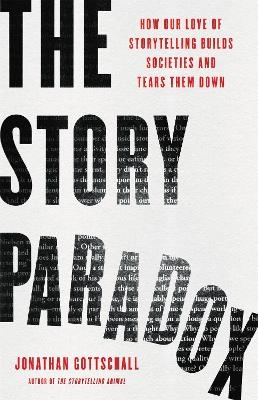
The Story Paradox
How Our Love of Storytelling Builds Societies and Tears them Down
Seiten
2021
Basic Books (Verlag)
978-1-5416-4596-7 (ISBN)
Basic Books (Verlag)
978-1-5416-4596-7 (ISBN)
Storytelling, a tradition that built human civilization, may soon destroy it
Humans are storytelling animals. Stories are what make our societies possible. Countless books celebrate their virtues. But Jonathan Gottschall, an expert on the science of stories, argues that there is a dark side to storytelling we can no longer ignore. Storytelling, the very tradition that built human civilization, may be the thing that destroys it.
In The Story Paradox, Gottschall explores how a broad consortium of psychologists, communications specialists, neuroscientists, and literary quants are using the scientific method to study how stories affect our brains. The results challenge the idea that storytelling is an obvious force for good in human life. Yes, storytelling can bind groups together, but it is also the main force dragging people apart. And it's the best method we've ever devised for manipulating each other by circumventing rational thought. Behind all civilization's greatest ills-environmental destruction, runaway demagogues, warfare-you will always find the same master factor: a mind-disordering story.
Gottschall argues that societies succeed or fail depending on how they manage these tensions. And it has only become harder, as new technologies that amplify the effects of disinformation campaigns, conspiracy theories, and fake news make separating fact from fiction nearly impossible.
With clarity and conviction, Gottschall reveals why our biggest asset has become our greatest threat, and what, if anything, can be done. It is a call to stop asking, "How we can change the world through stories?" and start asking, "How can we save the world from stories?"
Humans are storytelling animals. Stories are what make our societies possible. Countless books celebrate their virtues. But Jonathan Gottschall, an expert on the science of stories, argues that there is a dark side to storytelling we can no longer ignore. Storytelling, the very tradition that built human civilization, may be the thing that destroys it.
In The Story Paradox, Gottschall explores how a broad consortium of psychologists, communications specialists, neuroscientists, and literary quants are using the scientific method to study how stories affect our brains. The results challenge the idea that storytelling is an obvious force for good in human life. Yes, storytelling can bind groups together, but it is also the main force dragging people apart. And it's the best method we've ever devised for manipulating each other by circumventing rational thought. Behind all civilization's greatest ills-environmental destruction, runaway demagogues, warfare-you will always find the same master factor: a mind-disordering story.
Gottschall argues that societies succeed or fail depending on how they manage these tensions. And it has only become harder, as new technologies that amplify the effects of disinformation campaigns, conspiracy theories, and fake news make separating fact from fiction nearly impossible.
With clarity and conviction, Gottschall reveals why our biggest asset has become our greatest threat, and what, if anything, can be done. It is a call to stop asking, "How we can change the world through stories?" and start asking, "How can we save the world from stories?"
Jonathan Gottschall is a distinguished research fellow in the English Department at Washington & Jefferson College. He is the author of The Storytelling Animal, a New York Times Editor's Choice and finality for the LA Times Book Prize, and The Professor in the Cage, one of the Boston Globe's Best Books of the year. He has written for or been covered in the New York Times, Scientific American, the New Yorker, the Atlantic, the Chronicle of Higher Education, and The Millions. Gottschall has also appeared on popular podcasts like Star Talk, The Joe Rogan Experience, and Radiolab. He lives in Pennsylvania.
| Erscheinungsdatum | 22.11.2021 |
|---|---|
| Sprache | englisch |
| Maße | 156 x 238 mm |
| Gewicht | 460 g |
| Themenwelt | Geschichte ► Teilgebiete der Geschichte ► Kulturgeschichte |
| Geisteswissenschaften ► Psychologie | |
| Naturwissenschaften ► Biologie ► Humanbiologie | |
| Naturwissenschaften ► Biologie ► Zoologie | |
| ISBN-10 | 1-5416-4596-0 / 1541645960 |
| ISBN-13 | 978-1-5416-4596-7 / 9781541645967 |
| Zustand | Neuware |
| Informationen gemäß Produktsicherheitsverordnung (GPSR) | |
| Haben Sie eine Frage zum Produkt? |
Mehr entdecken
aus dem Bereich
aus dem Bereich
Schulbuch Klassen 7/8 (G9)
Buch | Hardcover (2015)
Klett (Verlag)
31,50 €
Buch | Softcover (2004)
Cornelsen Verlag
25,99 €


